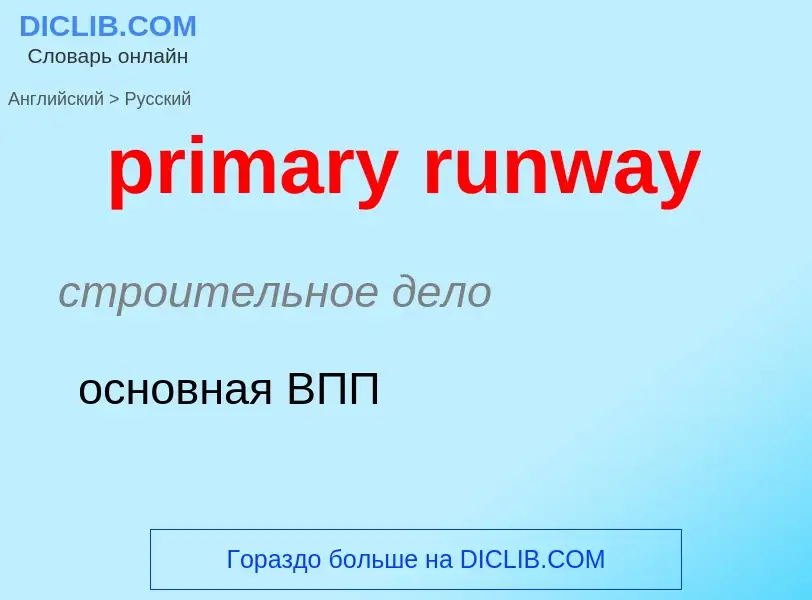Перевод и анализ слов искусственным интеллектом ChatGPT
На этой странице Вы можете получить подробный анализ слова или словосочетания, произведенный с помощью лучшей на сегодняшний день технологии искусственного интеллекта:
- как употребляется слово
- частота употребления
- используется оно чаще в устной или письменной речи
- варианты перевода слова
- примеры употребления (несколько фраз с переводом)
- этимология
primary runway - перевод на русский
строительное дело
основная ВПП
строительное дело
посадочные огни ВПП
строительное дело
входные огни ВПП
['rʌnwei]
этология
побежка
авиация
взлетно-посадочная полоса
взлетно-посадочный
строительное дело
проход
проезд
переходный мостик
взлётно-посадочная полоса, ВПП
катальный ход
(крановый) рельсовый путь
подвесной однорельсовый путь, монорельс
Смотрите также
существительное
общая лексика
спуск для гидросамолётов
огороженное место (для кур и т. п.)
спуск для гидросамолетов
огороженное место (для кур и т. п.)
американизм
ложе реки
тропа к водопою
тропа
проложенная животными
техника
подкрановый путь
железнодорожное дело
подъездной путь
спорт
дорожка для разбега
дорожка разбега
авиация
взлётно-посадочная полоса
взлетнопосадочная полоса
театр
узкая платформа, помост, соединяющий сцену с залом
[kləuzd'praim(ə)ri]
американизм
закрытые первичные выборы (голосуют только признанные приверженцы одной из партий)
Определение
Википедия

Runway edge lighting are used to outline the edges of runways during periods of darkness or restricted visibility conditions. These light systems are classified according to the intensity they are capable of producing:
- High intensity runway lights (HIRL)
- Medium intensity runway lights (MIRL)
- Low intensity runway lights (LIRL)
Many HIRL and MIRL systems have variable intensity controls, whereas the LIRLs normally have one intensity setting. At airports where there is a control tower, the tower will manage the lights to account for visibility and pilot preference, but some airports do not have control towers. These airports will have Pilot Controlled Lighting, or PCL, where pilots can adjust the lighting themselves by keying a microphone button a certain number of times.
The majority of runway edge lights are clear or white, but there are some exceptions to provide additional information to pilots in certain circumstances.
When an instrument runway lighting is designed, the last 600 metres (2,000 ft), or one-half of the runway length available (whichever is less), are bi-directional. They look white to the pilot approaching from the short end of the runway, but to a pilot approaching from the other end, who would be landing or taking off in that direction, they are yellow to indicate that the runway is nearing the end.

![An aircraft landing at [[Zurich International Airport]], with runway edge lights visible An aircraft landing at [[Zurich International Airport]], with runway edge lights visible](https://commons.wikimedia.org/wiki/Special:FilePath/Landing at Zurich International Airport.jpg?width=200)


![Runway sign at [[Madrid-Barajas Airport]], Spain Runway sign at [[Madrid-Barajas Airport]], Spain](https://commons.wikimedia.org/wiki/Special:FilePath/15R-33L - Aeropuerto de Madrid-Barajas - detail.jpg?width=200)
![A320]] cockpit A320]] cockpit](https://commons.wikimedia.org/wiki/Special:FilePath/A320-cockpit-night.jpg?width=200)
![[[Approach lighting system]] at [[Berlin Tegel Airport]] [[Approach lighting system]] at [[Berlin Tegel Airport]]](https://commons.wikimedia.org/wiki/Special:FilePath/APPROACH LIGHTS AT BERLIN TEGEL AIRPORT WITH AN AIR UKRAINE BOEING 737-400 TAKING OFF BERLIN GERMANY JUNE 2013 (9023668647).jpg?width=200)
![Triangular runway pattern at Armitage Field, [[Naval Air Weapons Station China Lake]] Triangular runway pattern at Armitage Field, [[Naval Air Weapons Station China Lake]]](https://commons.wikimedia.org/wiki/Special:FilePath/China lake.jpg?width=200)
![Badminton]], [[South Gloucestershire]], [[England]]. The strip is very simple: no lighting, no centerline, and no approach aids. The edge is marked by simple posts. Badminton]], [[South Gloucestershire]], [[England]]. The strip is very simple: no lighting, no centerline, and no approach aids. The edge is marked by simple posts.](https://commons.wikimedia.org/wiki/Special:FilePath/Grass airstrip at badminton england arp.jpg?width=200)
![A [[Mahan Air]] [[Airbus A310]] using [[reverse thrust]] in rainy weather at [[Düsseldorf Airport]] A [[Mahan Air]] [[Airbus A310]] using [[reverse thrust]] in rainy weather at [[Düsseldorf Airport]]](https://commons.wikimedia.org/wiki/Special:FilePath/Mahan Air A310 EP-MNO.jpg?width=200)
![An [[MD-11]] at one end of a runway An [[MD-11]] at one end of a runway](https://commons.wikimedia.org/wiki/Special:FilePath/McDonnell Douglas MD-11 KLM - Royal Dutch Airlines, AMS Amsterdam (Schiphol), Netherlands PP1151411211.jpg?width=200)
![hydroplaning]]. hydroplaning]].](https://commons.wikimedia.org/wiki/Special:FilePath/Pista Congonhas03.jpg?width=200)

![Runway 34 at [[Nagoya Airfield]] Runway 34 at [[Nagoya Airfield]]](https://commons.wikimedia.org/wiki/Special:FilePath/Runway 34, Nagoya Airfield (3937428018).jpg?width=200)

![Rocky Mountain Metropolitan Airport (KBJC)]] Rocky Mountain Metropolitan Airport (KBJC)]]](https://commons.wikimedia.org/wiki/Special:FilePath/Runway Number Painting.jpg?width=200)


![In the 1980s, [[Leeds Bradford International Airport]] extended its runway to take [[wide-body aircraft]] by building an [[overpass]] over the [[A658 road]]. In the 1980s, [[Leeds Bradford International Airport]] extended its runway to take [[wide-body aircraft]] by building an [[overpass]] over the [[A658 road]].](https://commons.wikimedia.org/wiki/Special:FilePath/Lbiarunwayflyover.jpg?width=200)
![[[Gibraltar International Airport]]'s runway 09/27, crossed by the one road between Gibraltar and Spain. [[Gibraltar International Airport]]'s runway 09/27, crossed by the one road between Gibraltar and Spain.](https://commons.wikimedia.org/wiki/Special:FilePath/Gibraltar runway 09 & 27.jpg?width=200)
![Atlantis]]. Atlantis]].](https://commons.wikimedia.org/wiki/Special:FilePath/Atlantis drag chute is open.jpg?width=200)
